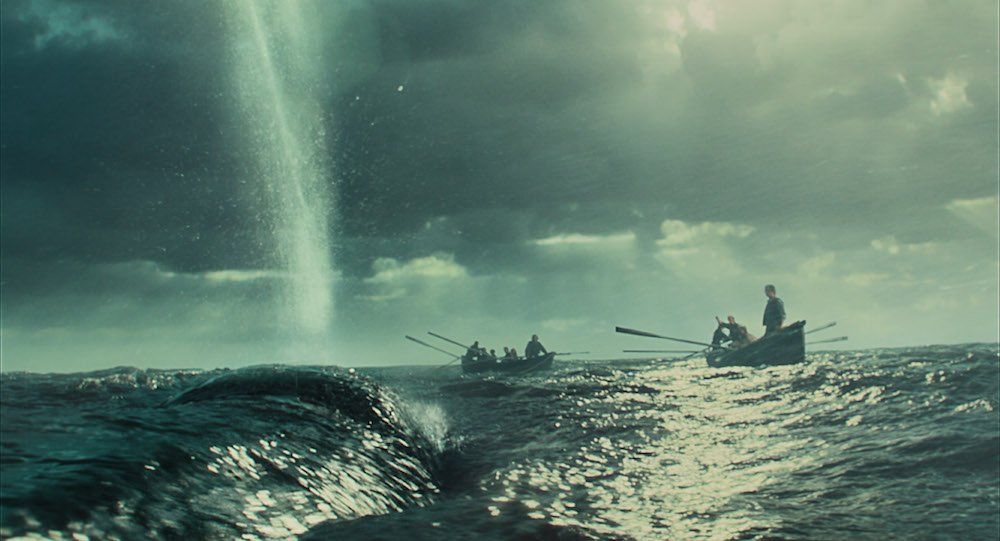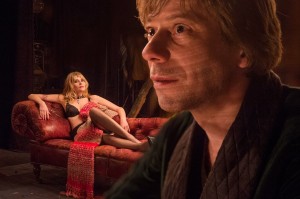
There are few things that fill me with such equal parts awe-struck admiration and deep, unsettling terror as the vast, open sea, a place rich with color and beauty that hides beneath it a complete lack of safety; if nature overcomes your tools, if your boat springs a leak, if you run out of food, you become utterly helpless, at the mercy of a world where every being is more capable than you. At its highest achievements, maritime art taps into this primal, often spiritual sensation, and no maritime artist captured the impossibly massive nature of the ocean better than J.M.W. Turner. His pinnacle, The Slave Ship (Slavers Throwing Overboard the Dead and Dying- Typhoon Coming On) is rightly regarded as a masterpiece, showing a rich, blood-red sky and swirling blue-grey-yellow waves that mask borderless bodies, cruelly thrown overboard, soon to be consumed by all manner of monsters and beasts, the sheer energy of his style subsuming fine detail in its storm of brushstrokes and lines.
The painting captures both nature’s indifferent destruction of the innocent (a common theme in romanticism that Werner Herzog would later run with in some of his most celebrated films) and the immoral acts of those that ride upon the sea, the evil of those constantly exposed to the merciless roil of the godless water, and in itself critiquing the capitalist and imperialist impulse that set those men out on their ship. At its best moments, In the Heart of the Sea pulls this same thread, almost Calvinist in its moralizing while also embracing the immensity of death’s hopelessness and the universe’s callous neutrality, expressing with an impossibly full heart the gorgeous dread of open water and open water’s incredible, unspeakable beasts. It sees the world as a gyre mercilessly churning the good and evil alike into a stew of pain, as mesmerizing as it is grotesque. The whale is not wrong or right, not good or bad; it merely is, a being protecting its own being against a threat, the white blood cells of the earth trying to rid the disease of man’s greed from its blood. In those moments, In the Heart of the Sea is poetry.
Unfortunately, Ron Howard refused to be given over to this pursuit, and instead tried to beat down a pulpy, mean, powerful story of death into one of his boilerplate, too often saccharine tales of the Triumph of the Human Spirit. He tries to make it a bedtime story, where the good are rewarded and the bad punished. Despite being a fictionalization of the true story that partially inspired Moby Dick (a lot of narrative roundabouts to get this to the screen), it feints from its heaviness at crucial moments, pulling us unpleasantly into a cockamamie wrap-around story where Herman Melville (Ben Whishaw), researching his next book, talks to the last survivor of the Essex (Brendan Gleeson) about the wreck. He spins a tale of jealously, of pride, of whales and starving men and even the occasional act of cannibalism, telling a story that’s been told so many times I feel no need to reiterate it again here. And look, I love Ben Whishaw and Brendan Gleeson as much as the next person, but their role in the film is so extraneous and distracting I find it difficult to believe that the confident, inventive Ron Howard of the sailing sections found such pablum worthy of being rescued from the cutting room floor. They’re not just unnecessary; they are entirely unfit for the film at large, shying away from the larger picture to focus on the far less resonant personal one.
But those sailing scenes! It’s hard for me to overstate their majesty. Not since Master and Commander: The Far Side of the World has cinema so ably and strongly conveyed the religious fear that the ocean can bring on, its truly unknowable depths and heights. Howard and his DP Anthony Dod Mantle use both epic frames worthy of IMAX and small-scale, Go-Pro style implanted camera shots clearly influenced by the film Leviathan to convey a range of emotions that never clash but instead feed into each other with simultaneous grace and violence. Here is the sea, in all of its beauty and all of its perversity, its expanse and its intimacy, untethered from an obligation of consistency or rationality. The CGI backgrounds are like matte paintings or, indeed, maritime landscapes, using their unreality to place the human players in a foreign, uncaring, surreal world. The compositions jump off the screen with their grace. If that framing device had been left in the trash where it belongs, In the Heart of the Sea would’ve confidently announced a new Ron Howard, a Ron Howard that seems ready and willing to try new things, to get his hands dirty, to show us the inside of the whale, as it were, disgusting, stinking, pink and raw. It would’ve bordered on a masterpiece.
Alas, the frustrations of the story, frustrations he must’ve added himself, stop Ron Howard from excelling. In the context of the bravura whaling scenes, the more traditional Howard-isms seem like jarring throwbacks from a different director entirely. His confidence in the water belies a seeming amateurishness (or just plain laziness) on land, spending an awful lot of time on things that he and the audience find no interest in. Therein lies the central problem; the good stuff is great, but it’s weirdly stretched out and diluted by scenes that go nowhere, tell us nothing, and morph a beautiful (and surprisingly violent) meditation on man’s place in the world into the kind of movie you’d flip to at 3:46pm when you’re at your parents’ house and want something inoffensive and generally well made that no one will argue with. Howard undercuts his successes with mediocrity, his fire with lukewarm water. The core of it all is worth it, and worth seeing on the biggest screen you can- those whales are something else. It’s just a shame that the rest of the movie falls short of its promise.
—
Directed by Ron Howard; written by Charles Leavitt, story by Charles Leavitt, Rick Jaffa, and Amanda Silver, from the book In the Heart of the Sea by Nathaniel Philbrick; starring Chris Hemsworth, Benjamin Walker, Cillian Murphy, Brendan Gleeson, Ben Whishaw, and Tom Holland; 122 minutes.



 Derek
Derek
 Isabelle
Isabelle